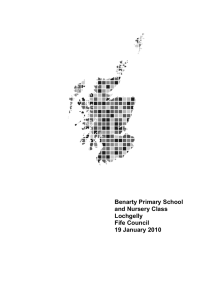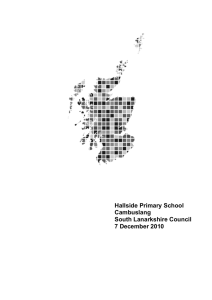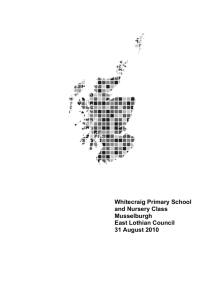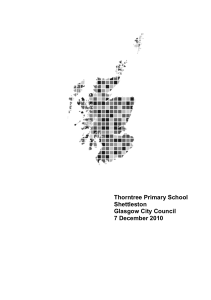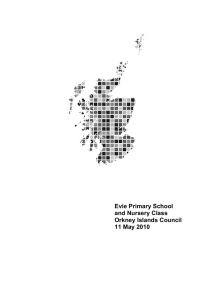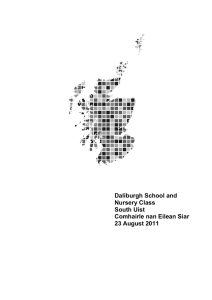Torbain Primary School and Nursery Class Kirkcaldy
advertisement
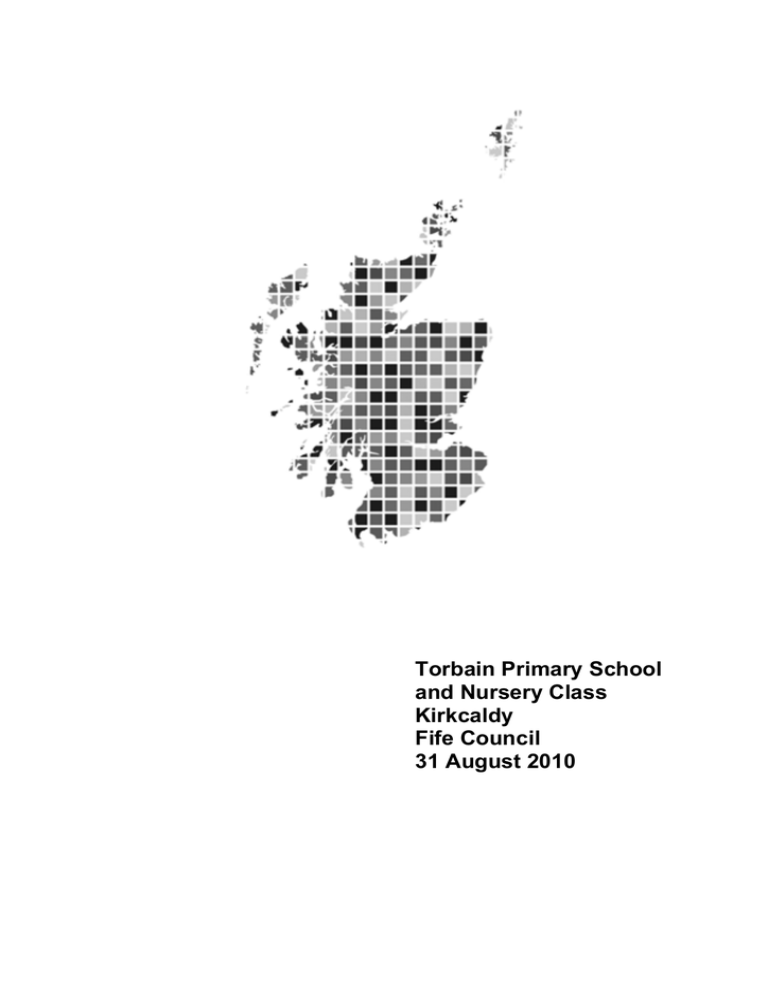
Torbain Primary School and Nursery Class Kirkcaldy Fife Council 31 August 2010 HM Inspectorate of Education (HMIE) inspects schools in order to let parents1, children and the local community know whether their school2 provides a good education. Inspectors also discuss with school staff how they can improve the quality of education. At the beginning of the inspection, we ask the headteacher and staff about the strengths of the school, what needs to improve, and how they know. We use the information they give us to help us plan what we are going to look at. During the inspection, we go into classes and join other activities in which children are involved. We also gather the views of children, parents, staff and members of the local community. We find their views very helpful and use them together with the other information we have collected to arrive at our view of the quality of education. This report tells you what we found during the inspection and the quality of education in the school. We describe how well children are doing, how good the school is at helping them to learn and how well it cares for them. We comment on how well staff, parents and children work together and how they go about improving the school. We also comment on how well the school works with other groups in the community, including services which support children. Finally, we focus on how well the school is led and how staff help the school achieve its aims. If you would like to learn more about our inspection of the school, please visit www.hmie.gov.uk. Here you can find analyses of questionnaire returns from children, parents and staff. We will not provide questionnaire analyses where the numbers of returns are so small that they could identify individuals. 1 Throughout this report, the term ‘parents’ should be taken to include foster carers, residential care staff and carers who are relatives or friends. 2 The term ‘school’ includes the nursery class or classes where appropriate. Contents 1. The school 2. Particular strengths of the school 3. How well do children learn and achieve? 4. How well do staff work with others to support children’s learning? 5. Are staff and children actively involved in improving their school community? 6. Does the school have high expectations of all children? 7. Does the school have a clear sense of direction? 8. What happens next? 1. The school Torbain Primary School is a non-denominational school with a nursery class. It serves the Torbain, Cluny, Dean Park and Chapel Village areas of Kirkcaldy. The roll was 628, including 128 in the nursery, when the inspection was carried out in June 2010. Children’s attendance was in line with the national average in 2008/2009. 1 2. Particular strengths of the school • The school is very welcoming. • Children have a strong commitment to their own and others’ learning. • Children’s life opportunities are being improved through the school’s emphasis on high achievement, health and wellbeing, rights, responsibility and respect. • Partnerships with parents are excellent. • High-quality provision for children who require additional support. • The excellent breadth and impact of learners’ experiences, both in and beyond the classroom. • Outstanding leadership and commitment to improvement from staff, guided by the headteacher. 3. How well do children learn and achieve? Learning and achievement Children learn and achieve very well in the nursery and the primary classes. They are keen, highly motivated and engaged in learning. They are active in their learning and like to share their work with others. They respond enthusiastically and responsibly to the many opportunities they are given to work with their peers. Children are attentive and responsive to staff and like to show that they are fully involved. Children feel, appropriately, that staff challenge them to do their best and give them good responsibility for their own learning. In 2 the primary classes, they benefit from having ownership of their learning through regular opportunities to plan their own and their class’s work. Children’s achievement is strong in the nursery and the primary classes. All children are developing confidence and they recognise the importance of this. They are learning well how to take responsibility for their own health and wellbeing. In the primary classes, the many opportunities to develop citizenship and leadership skills are having a positive impact on promoting children’s skills for life. Good examples of these opportunities include representative roles on different committees, buddying arrangements, and routines in classrooms where children lead and achieve in different ways. Children act responsibly and have respect for their peers and staff. For example, they support each other really well when they are working in groups without the direct supervision of a teacher, both in class and when taking part in physical activity outdoors. Most children benefit from taking part in voluntary sports and other activities outwith class. Any who do not initially opt in are encouraged strongly by staff to do so. They are invited to plan activities for themselves which they then go on to enjoy. The school’s promotion of high achievement for all children is a particular strength which includes high levels of attainment, maintained over several years. At the nursery stage and in the early years, children make a very strong start in English and mathematics. They really enjoy the thrill of discovering new ideas and ways of doing things, both from stimulating activities and from each other. Children in the primary classes attain very well too. Most children attain appropriate national levels in reading and writing and almost all do so in mathematics. Standards have been improving steadily in reading over several years and are now strong. A significant number of children attain national levels earlier than expected. A few children do better than national levels in reading and mathematics. Talking at all stages is a strength which stems in part from the way the school promotes personal confidence and self-esteem. Children listen well but, on occasion, their enthusiasm to contribute hinders their listening. 3 Children would benefit from practising their writing skills more fully in different contexts. Children’s mathematical skills are developing very well. Almost all children carry out written and mental calculations accurately. They use their secure understanding of number, measuring and problem-solving effectively in a wide range of indoor and outdoor activities. They are skilled at working collaboratively in groups on different numeracy activities. Curriculum and meeting learning needs The school’s curriculum blends a wide range of class and beyond class experiences for all children. As a result, children’s life opportunities are being improved through an emphasis on, for example, active learning, health and wellbeing, rights, responsibility and respect. Staff provide varied and stimulating opportunities for children to learn and consolidate their skills, including in the outdoor environment and through homework. All children benefit from at least two hours of high-quality physical education and activity each week. Almost all staff, including many non-teaching members of staff, support the delivery of the wider curriculum for the benefit of all children. The school is using Curriculum for Excellence to very good effect to improve its work. For example, staff and children have embedded the promotion of important personal attributes, such as confidence, in their daily practice. Staff make very effective use of the strong transition arrangements from nursery into P1, and they prepare children well for moving on from P7 to secondary school. Overall, the school is meeting children’s learning needs very well. Provision for children who require additional support is high quality and, as a result, children are progressing very well. Staff plan carefully and, when appropriate, involve children themselves, their parents and partner agencies. This ensures that the specific programmes these children follow are well matched to their needs and interests. Across the nursery and primary classes, staff have been developing commendable approaches which rely less on continuous teaching input but which give children more individual and group responsibility for their own learning. This is a very promising improvement which will 4 serve children well in their futures. At times, however, particularly in English, teachers need to ensure that all children are suitably challenged and that learning progresses at a suitably brisk pace. 4. How well do staff work with others to support children’s learning? Staff work very well with others to support children’s learning. Staff and parents have a very strong partnership which supports children and encourages pride in learning and achievement. Parents are happy with the school overall and feel it is well led. They are confident that their children are enjoying learning, progressing well and are safe and well cared for. This confidence stems in part from the way the school encourages parents to share in their children’s learning, for example by visiting classes at the end of topics, taking part in lessons and in shared finishes. Reports on children’s progress and regular newsletters are helpful and informative. Partnerships with cluster schools and a range of agencies to support children’s learning are strong. The parent council supports the school in a constructive way, as do parents more widely in supporting a range of fundraising activities. 5. Are staff and children actively involved in improving their school community? Yes, staff and children are actively involved in improving the school community. The school’s emphasis on personal responsibility and respect has contributed to a strong commitment to improving learning, together. Staff are justifiably very positive about their roles and the impact they are having in taking forward school improvements. Children contribute their ideas for improvement in a very constructive way. Parents and the parent council contribute well to school improvement too, although some parents would like to know more about how their views are taken into account. The school should look 5 into this. Overall, the school’s range of processes for self-evaluation are very strong and effective. 6. Does the school have high expectations of all children? The school has high expectations of children and they respond very well. Children are rightly very positive about their school. Children, parents and staff respect each other and recognise their rights and responsibilities. As a result, the school has a strong work ethic where only the very best behaviour is accepted. Many children are developing important leadership skills. They take their responsibilities as leaders very seriously and discharge their duties very well. All staff have been trained appropriately for child protection. The school has sound procedures for securing children’s safety and wellbeing. Equality and fairness are the norm in the daily conduct of the school and are further promoted through the curriculum and charitable activities. The school has appropriate arrangements for religious observance. The school rarely receives complaints but these are handled well when it does. 7. Does the school have a clear sense of direction? Yes, the school does have a strong and clear sense of direction. It is justifiably confident about its work and successes and the positive impact it is having on children’s lives. Leadership across the school is outstanding because all staff recognise their leadership responsibilities and carry them out to very good effect. The school’s approach to professional development and reflection underpins this highly-effective approach to leadership of all staff, and places the school in a strong position for harnessing the opportunities of Curriculum for Excellence. The headteacher provides high-quality strategic leadership and management of change and is very highly regarded. She gives children and their parents, staff and the community a clear sense of what the school is seeking to do for them and how it should deliver. All members of the senior management team are thriving as leaders 6 under the headteacher’s guidance and each is having a major impact on the quality of the school’s work. Collectively they form a highly-effective leadership team. Overall, the school has a strong capacity to continue improving. 8. What happens next? The inspection team was able to rely on the school’s robust self-evaluation. As a result, it was able to change its focus during the inspection to support further improvements within the school. The school provides a very good quality of education. Therefore, we will make no further visits in connection with this inspection. The education authority will inform parents about the school’s progress as part of the authority’s arrangements for reporting to parents on the quality of its schools. We have agreed the following areas for improvement with the school and education authority. • Implement the school’s improvement strategies as planned, including broadening contexts for writing. • Ensure pace and challenge in lessons continue to strengthen as learning and teaching approaches develop. At the last Care Commission inspection of the nursery class there were no requirements or recommendations. 7 Quality indicators help schools and nursery classes, education authorities and inspectors to judge what is good and what needs to be improved in the work of a school and a nursery class. You can find these quality indicators in the HMIE publications How good is our school? and The Child at the Centre. Following the inspection of each school, the Scottish Government gathers evaluations of three important quality indicators to keep track of how well all Scottish schools and nursery classes are doing. Here are the evaluations for Torbain Primary School and Nursery Class. Primary school Improvements in performance Learners’ experiences Meeting learning needs excellent excellent very good Nursery class Improvements in performance Children’s experiences Meeting learning needs excellent excellent very good We also evaluated the following aspects of the work of the school and nursery class. The curriculum Improvement through self-evaluation HM Inspector: Graham Norris 31 August 2010 8 very good very good When we write reports, we use the following word scale so that our readers can see clearly what our judgments mean. excellent very good good means means means satisfactory weak unsatisfactory means means means outstanding, sector leading major strengths important strengths with some areas for improvement strengths just outweigh weaknesses important weaknesses major weaknesses If you would like to find out more about our inspections or get an electronic copy of this report, please go to www.hmie.gov.uk. Please contact us if you want to know how to get the report in a different format, for example, in a translation, or if you wish to comment about any aspect of our inspections. You can contact us at HMIEenquiries@hmie.gsi.gov.uk or write to us at BMCT, HM Inspectorate of Education, Denholm House, Almondvale Business Park, Almondvale Way, Livingston EH54 6GA. Text phone users can contact us on 01506 600 236. This is a service for deaf users. Please do not use this number for voice calls as the line will not connect you to a member of staff. You can find our complaints procedure on our website www.hmie.gov.uk or alternatively you can contact our Complaints Manager, at the address above or by telephoning 01506 600259. Where the school has a nursery class, you can contact the Complaints Coordinator, Headquarters, Care Commission, Compass House, Riverside Drive, Dundee DD1 4NY, telephone 0845 603 0890. Crown Copyright 2010 HM Inspectorate of Education

